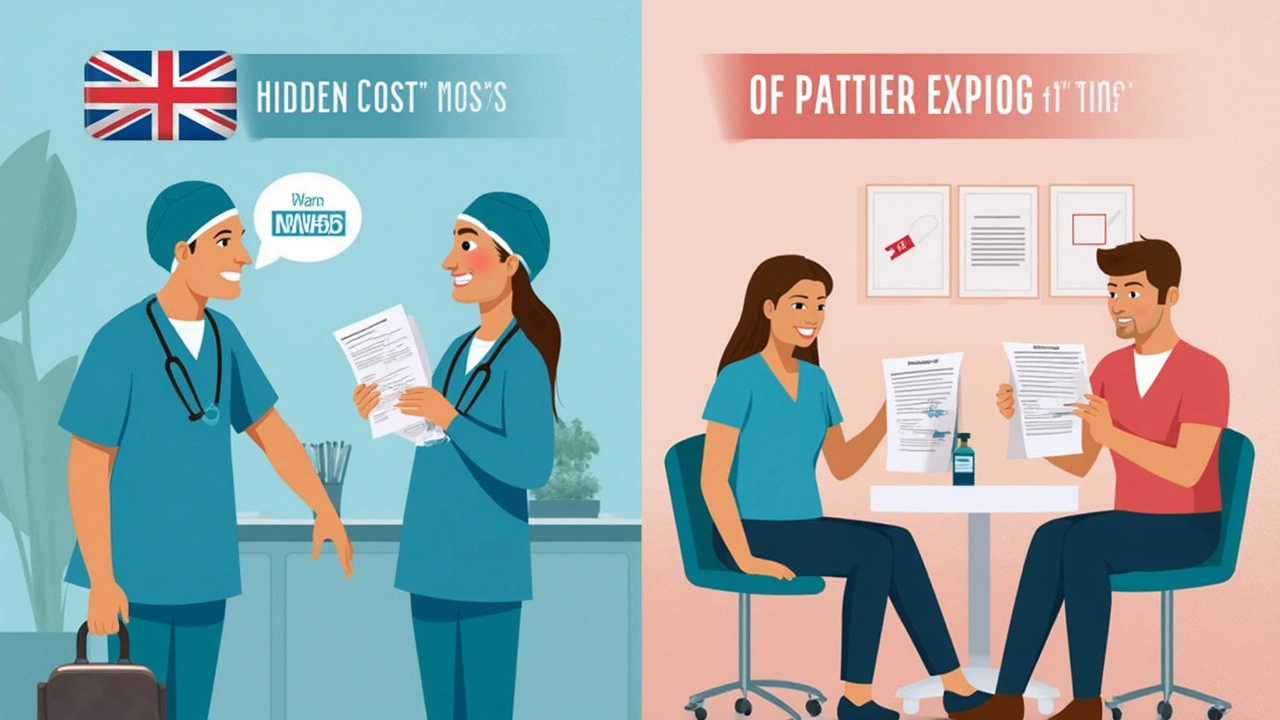 Apr, 20 2025
Apr, 20 2025
Surgery catches people off guard—not just because of the health scare, but because the first question everyone asks is, “Will I have to pay for this?” If you’re in the UK, the answer is usually “no.” For the most part, the NHS picks up the bill, so you don’t get smacked with a surprise invoice before you wake up from anesthesia.
But hang on; it’s not always as simple as that. The NHS won’t charge you for the surgery itself if you’re a UK resident, but there are situations where you might still see a bill. And if you’re not from the UK or thinking about skipping the NHS queue by going private, the rules get confusing fast.
Let’s cut through the rumors and break down what really happens when you need an operation here. Are there exceptions? Yes. Are there sneaky extra costs? Sometimes. The details matter—especially if you’re moving here, visiting, or want to weigh up private healthcare versus the good old NHS.
- How the NHS Covers Surgery
- Who Qualifies for Free Surgery?
- Hidden Costs and Exceptions
- Private Surgery: Is It Worth Paying?
How the NHS Covers Surgery
So, is surgery free in the UK? If you’re living in the UK and using the NHS, the answer is usually yes. The NHS started in 1948, and from day one their main goal was free healthcare at the point of delivery. That includes almost all kinds of surgery—emergencies, planned treatments, and even some complex stuff like heart bypasses or joint replacements.
The big catch: to get your surgery UK-style for free, you need to be ‘ordinarily resident’. In simple terms, you’re living here long-term. UK citizens, permanent residents, people with the right visas, and even some expats returning home can usually access NHS surgery with no bill at the end. Tourists or folks visiting short-term? Not so lucky—you’re likely on the hook for the full price unless there’s a reciprocal agreement with your home country.
Your journey usually starts with your GP (family doctor) who assesses you, refers you to a specialist, and then you get put on an NHS waiting list. Once the specialist agrees that you need an operation, the NHS covers:
- Consultations and pre-op tests
- The actual surgery
- Hospital stay and care
- Follow-up appointments or rehab (if needed)
No out-of-pocket cost for any of that—no co-pays, no excess, no hidden extras for the procedure itself. The main exception is private rooms, TV, or extra comfort add-ons if you want things a bit fancier than the shared NHS wards. Everyday stuff like a gown, food, anaesthesia, and standard drugs are included in your NHS care.
Check out this breakdown of typical operations the NHS covers, for free:
| Type of Surgery | Covered by NHS? |
|---|---|
| Appendectomy (appendix removal) | Yes |
| Hip replacement | Yes |
| Caesarean section (C-section) | Yes |
| Cataract removal | Yes |
| Cosmetic surgery (non-medical reason) | No |
The NHS doesn’t cover purely cosmetic procedures unless there’s a clear medical need—think breast reconstruction after cancer, not just a boob job for looks. So if you’re asking about free healthcare or free surgery in the UK, the key is whether the operation is medically necessary.
Who Qualifies for Free Surgery?
So, who actually gets free surgery in the UK? It mostly comes down to whether you meet the criteria for NHS care. If you've got your feet on UK soil and live here long-term, you probably won't pay a penny upfront for most surgeries. Here's how it works.
If you're legally “ordinarily resident” in the UK—basically, the NHS recognizes you as someone living here on a proper basis—you can access surgery and other treatment for free. This is true for British citizens, people from the EU who’ve settled under the Settlement Scheme, and just about anyone with a visa for long-term stay.
Not sure if you count? The UK government spells it out: regular tourists, short-term visitors, and people working illegally can’t just walk in and get free treatment. NHS England says,
"Access to free NHS care is based on lawful and settled residence in the UK, not nationality or payment of tax.” — NHS England
Here’s a simple breakdown of NHS costs for different groups:
| Group | Free NHS Surgery? |
|---|---|
| UK Resident | Yes |
| Student (on a long-term course) | Yes (with immigration health surcharge) |
| EU Citizen (Settled/Pre-settled Status) | Yes |
| Visitor or Tourist | No |
| Short-term Worker (without health surcharge) | No |
If you’re in the UK legally for at least six months (like students or some workers), you can pay the Immigration Health Surcharge upfront when applying for your visa. This covers NHS care, including surgery UK needs, while you’re here. If you’ve just popped over for a holiday or are staying illegally, you’ll be charged—and it’s not cheap.
There’s also a safety net. Emergency, life-saving treatment is often provided even if you can’t pay, but you might get invoiced later. Children in state care and refugees generally get full access. If you're unsure, always check your immigration status and talk to your local GP practice—they can explain your rights in plain English.

Hidden Costs and Exceptions
Most folks think surgery in the UK is totally free if you use the NHS, but there’s some small print that can catch you out. The core operation is free for UK residents, sure, but a few extras and exceptions can pop up on your bill if you’re not careful.
If you need stuff like crutches, surgical boots, or certain painkillers to take home, be ready to pay out of pocket. NHS covers the main event—your surgery UK—but take-home items and add-ons aren't always included. Prescriptions after surgery, like antibiotics or painkillers, usually cost £9.90 per item in England (Scotland, Wales, and Northern Ireland have free prescriptions). Need a private room? That’s extra too.
Dental and cosmetic surgery is another story. The NHS will only cover dental operations if they’re urgent or necessary, not just for a better smile. Same with cosmetic procedures—purely for looks, you’ll be footing the bill. Some rare or experimental treatments might not be covered either, so it pays to check in advance.
If you’re not a UK resident or haven’t sorted your paperwork—say you’re an expat just arrived or a tourist—don’t count on free surgery. The NHS has rules about residency: you usually need to prove you’re living in the UK legally and not just visiting on holiday.
Here’s a quick peek at what’s not included:
- Non-urgent dental or cosmetic surgery UK
- Take-home items (like support stockings, splints, or post-op dressings)
- Most prescription meds post-operation (at least in England)
- Private or en-suite hospital rooms
- Treatments done through private healthcare
- Surgery for overseas visitors or those without UK residency
A 2023 study by the Nuffield Trust found that over 500,000 non-residents used NHS services in the year before, and about a quarter of those were billed for treatment, including NHS costs for surgery. These fees can be high—simple procedures can run into thousands if you’re uninsured as a visitor.
Plan ahead: If you think your case fits into one of these exceptions, it’s smart to ask the hospital what’s free and what’s not. Double-check your healthcare insurance UK if you’re just moving over, since private health insurance can help cover gaps for things the NHS leaves out.
Private Surgery: Is It Worth Paying?
So, what if you don’t want to wait around for an NHS slot or you want a particular surgeon? That’s when people look at private surgery UK options. But is it worth the price tag?
Private surgery means you pay—either from your own pocket or through private healthcare insurance UK. Costs can range from £2,500 for simple procedures like hernia repairs, up to £15,000+ for things like joint replacements. These aren’t fake numbers; clinics publish their price lists online, making it easy to compare. Many people use sites like Private Healthcare UK to get quick estimates.
| Procedure | Average Private Cost | Typical NHS Wait |
|---|---|---|
| Hip Replacement | £13,500 | Up to 18 months |
| Gallbladder Removal | £6,000 | 3 to 9 months |
| Cataract Surgery | £2,500 per eye | 6 to 12 months |
One big upside: you control when and where you’re treated, and you often get a private room like you see on TV. Some folks also choose it for access to newer treatments, or to get surgery that’s limited on the NHS for non-urgent cases (think certain types of weight loss surgery).
But—and this is a big but—paying privately doesn’t always mean better care. NHS surgeons frequently operate in private clinics too. The staff aren’t necessarily different, but the environment might feel less hectic. If your insurance excludes pre-existing conditions, you might have to pay the whole bill yourself, so read policy details closely.
Private care also doesn’t cover everything. Follow-up visits, physio, prescription drugs, or complications? Sometimes those are billed separately. Always, always double-check what’s included before you sign anything. Ask for a quote that spells out the full costs, not just the surgery itself.
If you’re choosing between waiting or paying, weigh these things:
- How urgent is your surgery? If it’s not life-or-death, NHS can still be a solid bet—and it’s free for residents.
- How long is the NHS wait for your operation? If it’s too long for your health, private can make sense.
- Do you have suitable private insurance, or are you planning to self-fund?
- Will you need aftercare, rehab, or extra scans? Factor these into your budget.
At the end of the day, splashing cash for private surgery UK is often about control and speed rather than quality. Some people swear it’s worth it, others are shocked at the hidden costs. If you’re thinking about it, ask lots of questions so there aren’t any expensive surprises.
